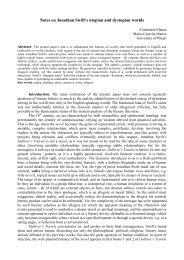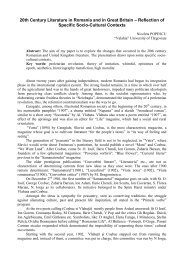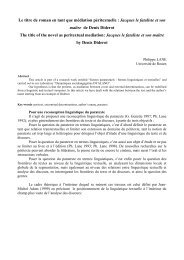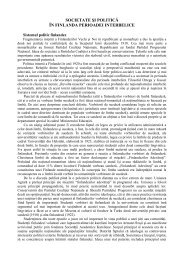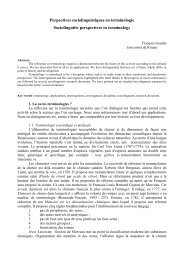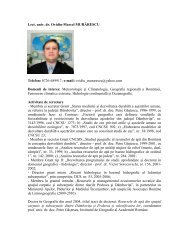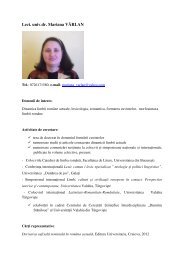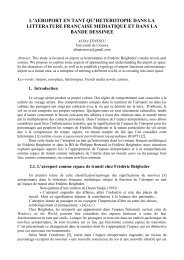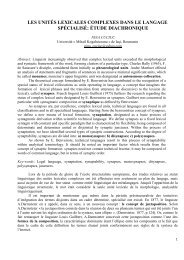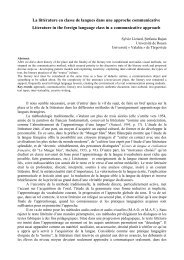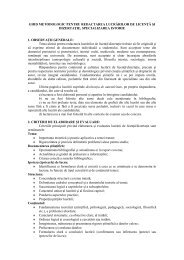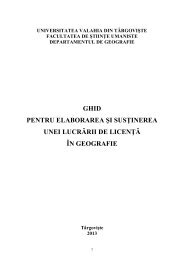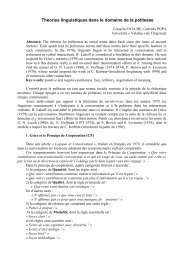THE ANNALS OF „VALAHIA” UNIVERSITY OF TÂRGOVIŞTE
THE ANNALS OF „VALAHIA” UNIVERSITY OF TÂRGOVIŞTE
THE ANNALS OF „VALAHIA” UNIVERSITY OF TÂRGOVIŞTE
Create successful ePaper yourself
Turn your PDF publications into a flip-book with our unique Google optimized e-Paper software.
36<br />
The Annals of „Valahia” University of Târgovişte<br />
what the authorities were planning to do next: whether any measures were going to<br />
be taken as a result of the attacks, whether they were going to try to counteract the<br />
event in any way. All these are expectations given by the 'context' in which the<br />
event occurred and by the people's understanding of the events, their political views,<br />
their involvement in the events, direct or indirect (whether they personally were<br />
part of the events or someone in their family, or someone they knew), and even,<br />
why not, the place where they were when the events took place or when they found<br />
out about them. All these contribute to the use of language and to what Richardson<br />
calls the 'social-ness' of language, in that 'language first represents social realities<br />
and second contributes to the production and reproduction of social reality or social<br />
life.' (Richardson 2007: 10)<br />
The second assumption about language that Richardson takes into<br />
consideration when analysing newspapers is that 'language use enacts identity'.<br />
'What this means is that people project themselves as a certain type of person, and<br />
that the identity that a person projects relates, in part, to the activities that they're<br />
attempting to accomplish.' (Richardson 2007: 11) In the case of political leaders<br />
this is an obvious situation, as, by the type of identity they construct for themselves,<br />
they seek to project a certain image of themselves and to impose certain<br />
assumptions about what they aim at. Even more, because the aspects of<br />
communication are open to a certain degree of interpretation, listeners may<br />
interpret the meaning of an utterance in relation to the speaker's identity and to the<br />
context as well. But, 'in order to fully appreciate communication you have to<br />
recognise the identities and the activities that are being acted out. Put another way,<br />
our understanding of the communicative act is shaped, in part, by who is<br />
speaking/writing and the context in which this occurs.' (2007: 11) This entails that<br />
the listener/reader has to have a certain knowledge of the speaker's identity and of<br />
the area in which the speaker acts, in our case, this implies that the listener has<br />
knowledge about the events the speaker talks about and also about politics or<br />
political aspects involving the issue under debate.<br />
Richardson's third assumption about language and 'perhaps the most<br />
important one to grasp' is that 'language use is always active; it is always directed<br />
at doing something; and the way in which language achieves this activity is<br />
always related to the context in which it is being used' (2007: 12) He makes his<br />
point by relating to certain verbs expressing the active nature of communication<br />
that he uses to describe journalists' activity: 'journalists may use language to<br />
inform us of an event, or to expose wrongdoing, or to argue for or against<br />
something. Each of these verbs – inform, expose and argue for – demonstrates the<br />
active nature of communication in these cases.' (2007: 12) This same assumption,<br />
we would add, is valid in political speeches and statements when the speaker uses<br />
language to announce something, or to debate upon something or argue for<br />
something, with the aim of convincing of something. All these verbs denote the<br />
active nature of the communicative act.




